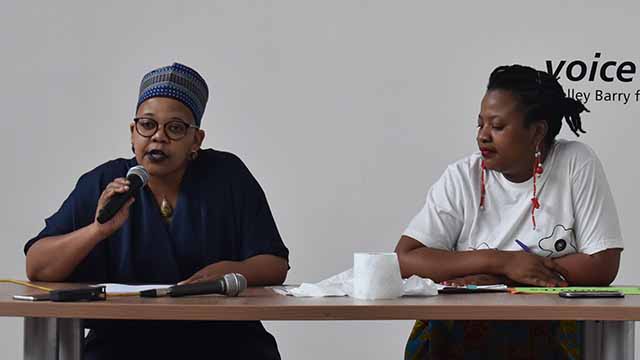
By Hlamvu Yose, Journalism & Media Studies postgraduate student
Dr Siphokazi Magadla, Senior Lecturer in Political Science and International Relations at Rhodes University, knows what it means to be a strong African woman, as her recent appointment by President Cyril Ramaphosa to serve on the Presidential Independent High-Level Review Panel on Intelligence illustrates.
Dr Magadla presented the second keynote address entitled ‘From ukuzabalaza to ukutabalaza (from struggle to hustle): silence and strength in the lives of ex-combatants after apartheid’ at the recent Afems 2018 conference held at Rhodes University.
If African womanhood is defined by strength, she said, then female soldiers during and after apartheid can be said to have had “super strength”.
“Women combatants never used violence to satisfy their needs whether as women or as soldiers,” she declared. “But even in their non-violence and resilience, women were sexually abused in the exile camps by ANC and PAC members. It was a gender struggle for liberation. Women were constrained by patriarchy since they were treated as sex objects instead of liberation fighters.”
The contribution women made in the liberation struggle, it seems, simply remains in the memories of those who remember they were there, since their legacies are rarely written into any history books.
Former combatants are seen as threats by the political community rather than ordinary citizens. They are seen to threaten the social order in South Africa.
Feminism shows that although women participate in a war, they will not be recognised unless they participate in domestic activities. Dr Magadla used the example of how a popular image depicting a woman with a baby on her back and a rifle in her hands illustrates this concept. She pointed out that even “when a woman puts the rifle down, her expected duties as a mother still continue”.
Furthermore, once a war is over, women are expected to go back to the feminine stereotypes in order to protect societal norms. Dr Magadla stated women “in the post-apartheid era carry the heavy burden of being both the financial and emotional support structures for their families”. “They are expected to find means to provide for their families, and if they are not employed, they hustle,” she said.
‘Hustling’ is the process of finding ways to take care of everyday household necessities, while avoiding hand-to-mouth earnings.
“Ndiyakutabalaza, phanda, hustle - these words all mean the same thing,” she said.
Finally, Dr Magadla stressed how the view that women are emotionally and psychologically stronger than men obscures the traumas that women face on a daily basis. “These kind of perceptions make us wonder if women are only strong because they do not have the privilege to be weak,” Dr Magadla concluded.
